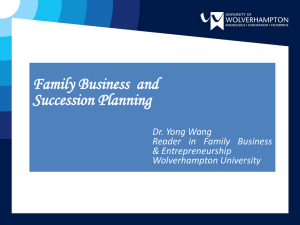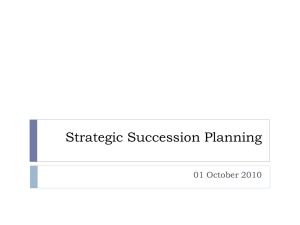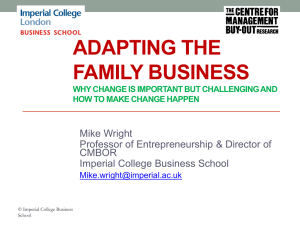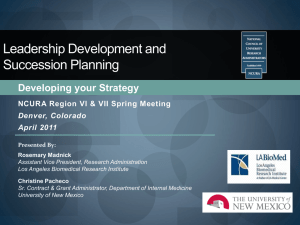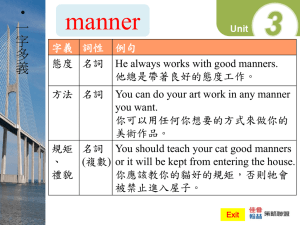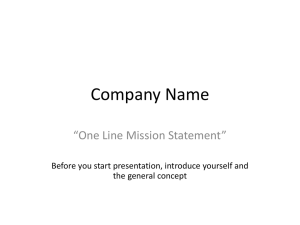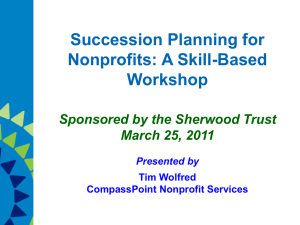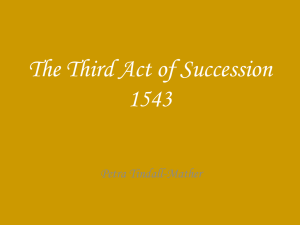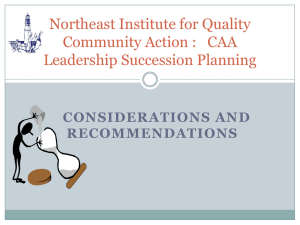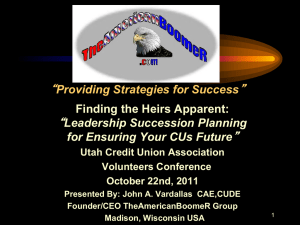SEPT 2013 Business Exit & Succession Planning
advertisement
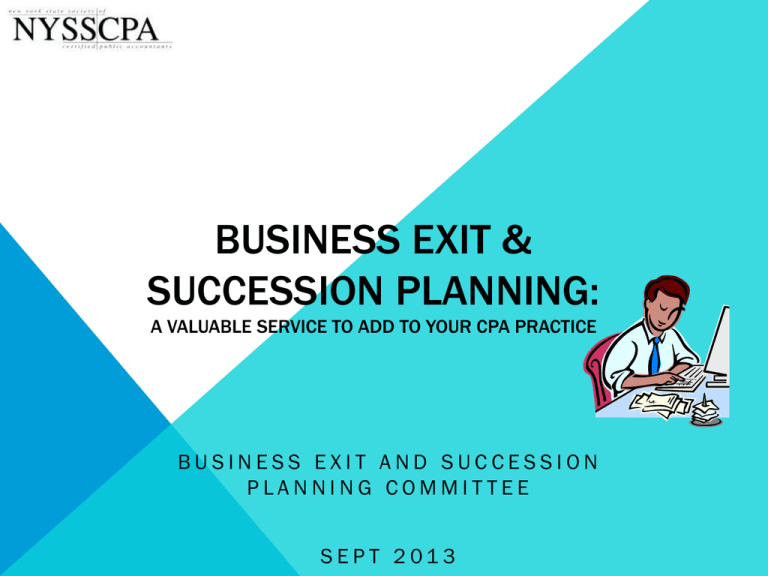
BUSINESS EXIT & SUCCESSION PLANNING: A VALUABLE SERVICE TO ADD TO YOUR CPA PRACTICE BUSINESS EXIT AND SUCCESSION PLANNING COMMITTEE SEPT 2013 SUCCESSION VS. ESTATE VS. EXIT PLANNING Succession Planning is a formalized process to successfully transfer company leadership from Current Management (CM) to Successor Management (SM). It is designed to ensure the ongoing viability of the company. Estate Planning is a process designed to successfully transfer company ownership (wealth) from current shareholders to future shareholders (or others). It is designed to address the personal goals of shareholders and is structured to achieve the most economic and tax efficient result possible. 1 SUCCESSION VS. ESTATE VS. EXIT (CONT’D) • Exit Planning: process an entrepreneur goes through to determine his/her plan to leave the business This usually involves the transition of both ownership and management responsibilities and should usually be done before estate and succession planning. 2 WHY SUCCESSION PLANNING? Overwhelming raw statistics from a number of studies and articles: • • • Family businesses comprise 80-90% of all business enterprises in the U.S. 40% of family companies say they will transition leadership in next five years 88% say same family(ies) will control business in five years They need help. Consider the rates of succession statistics: • • • 30% survive into second generation 12% survive into third generation 3% operate into fourth generation 3 WHY SUCCESSION PLANNING? (CONT’D) There appear to be some reasons why they need help Owners know the issue; and CPA’s are perfectly positioned •40% of family companies that will transition in next five years are without a “how to” plan •Less than 2/3 of significant holders in family business know senior generations’ share transfer intentions •2007 American Family Business Survey: • #1 of top 10 challenges facing Family Businesses today = succession • Same survey: spouse is closest advisor; accountant is next 4 WHY SUCCESSION PLANNING? (CONT’D) Without a plan or process, most entrepreneurs and management teams hope succession will happen-hope is not a strategy 5 WHY EXIT PLANNING? Exit Planning is a proven process that can maximize the financial return, minimize the tax liability, plan for contingencies and increase the likelihood of a successful transfer of a business 85% of all small business owners do not have an exit plan, a wealth management plan, and/or an advisory team to assist them Very few start the process early enough to achieve the maximum benefit of exit planning Most entrepreneurs wait too long; instead make the “end game” part of your overall operating strategy 6 WHY EXIT PLANNING? (CONT’D) Ingredients of a Successful Exit Plan: A written Exit Plan based on the owner’s objectives A strong management team in place An experienced team of advisors to design and implement the plan Time Cash flow and a quantified business value 7 WHY EXIT PLANNING? (CONT’D) Most business owners spend more time planning a family vacation than how to exit from their business This is not due to a lack of desire or intelligence. It is simply because they don’t know how or where to begin The vast majority of owners are unaware there is a specific planning and implementation process that can help ensure they achieve their objectives 8 WHY THE CPA’S ROLE IS CRITICAL CAPABLE OF “OWNING” Can help document the overall processes Coordinates other outside advisers (legal, estate, asset managers, etc.) • Has good feel for leadership style of potential successor; can bridge the generations (and keep the client) • Will be more company versus personality/ family member focused Provides a very objective viewpoint Knows the business and the numbers Inner Sanctum Access- you are the “trusted advisor”; you should be a critical piece of the Succession and Exit Planning Process 9 SUCCESSION PLANNING PROCESS Seven step documented process to achieve successful transfer from Current Management (CM) to Successor Management (SM): Determine how the succession planning process will work including a communication plan Consider the view of the CM including objectives, timing and personal matters Determine the financial needs of the CM who is retiring and the viability of the business to support those needs Consider the potential SM including capabilities, comfort with supervising former peers and role acceptance Understand the role family members will play in the company including those outside the business and future family members Maintain a process which provides for periodic reviews to determine viability of the Succession Plan including after the plan is in place and is being executed Incorporate an appropriate methodology for transferring wealth in accordance with current shareholders’ desires 10 EXIT PLANNING PROCESS Identify owner exit objectives Quantify business and personal financial resources and needs Maximize and protect business values Ownership transfer to third parties Ownership transfer to insiders Business continuity Personal wealth and estate planning 11 NEXT STEPS? Business Exit & Succession Planning involves many skillsets and capabilities; some of which just come from experience. The best and easiest thing to do is to join the Business Exit & Succession Planning Committee of the NYSSCPA. The purpose of this Committee is to educate CPA’s on these subjects. If you are interested, please reach out to the Chairman, Bernie Leone or any committee member listed on the NYSSCPA website. bleone@withum.com 212-829-3207 12 13
